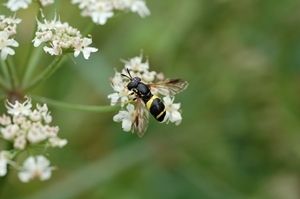 Two leading scientists recently expressed their concerns to a cross-party group of politicians that although bees are the focus of most attention, other important pollinating insects, such as hoverflies are in an equally perilous state and need help.
Two leading scientists recently expressed their concerns to a cross-party group of politicians that although bees are the focus of most attention, other important pollinating insects, such as hoverflies are in an equally perilous state and need help.
The All Party Parliamentary Group (APPG) meeting held at Westminster, highlighted that we need to up our game in terms of creating the right farmland environment to protect vital bees and other important pollinating insects, while at the same time, increasing food production. Encouraging people to eat more peas and beans which provide flower rich habitats for pollinators could be an important step in the right direction.
The Game & Wildlife Conservation Trust’s research on pollinators forms part of its long-standing studies on insect declines, notably its leading 40-year research on the decline of grey partridges. This crucially exposed the link between the indirect use of pesticides and the loss of vital insects that young chicks depend on when they first hatch.
Members of the All Party Political Group heard presentations from Dr John Holland of the Game & Wildlife Conservation Trust (GWCT) and Professor Richard Pywell from the Centre for Ecology & Hydrology (CEH) who provided valuable insight on the current research trends on pollinators. Following the launch of the Governments national pollinator strategy last year, the APPG meeting was well timed to help inform policy decisions on these important species,
The Game & Wildlife Conservation Trust’s Head of Farmland Ecology, Dr John Holland, outlined the Trust’s farmland research, which has been investigating the best methods of supporting pollinators within intensive farming systems. His research reveals that simple yet effective solutions should be the driving force behind future Government funded Agri-environment schemes to help pollinating insects.
The loss of mixed farming and a 97 % reduction in flower rich meadows are contributing to the loss pollinators. One solution is to put flowers back into the countryside through Agri-Environment Schemes, but as Dr Holland explained, “We have to be careful about what is sown, and where, so that pollinators are not deterred from pollinating food crops and native wild flowers.”
Dr Holland continued, “So far uptake within Agri-Environment Schemes for creating new flower-rich habitats has been poor. We believe much better advice to farmers together with greater reward for options that involve establishing new flower rich habitats is a step in the right direction.
“We also need to increase the amount of flowering crops grown in the UK such as beans and peas and encourage more people to eat these crops in this country. There may also be an opportunity to replace the three million tonnes of soya meal and beans imported annually for livestock feed with home-grown crops. We therefore need to rely less on imported food and increase the area of horticultural crops that are predominantly flowering, especially fruit. It is vital that we consider the wider picture if we are to be successful in improving pollination of our crops and wild plants.”
Professor Richard Pywell from CEH gave a stark warning to the audience of MPs, stating that the annual value of insect pollination services to agriculture has been estimated to be up to £153bn globally and £400m in the UK but without pollinators’ food production and natural ecosystems could collapse.
He said, “There still remains uncertainty as to the possible causes of declining pollinator numbers, but it is likely to be a complex mix of factors including habitat loss, pesticide use, pathogens and disease. However, CEH has been developing low-cost wildflower seeds mixes to create pollen and nectar rich habitats on low-yielding edges and corners of fields.”
So far, monitoring has shown that these plots are good value for money and surprisingly their effectiveness seems to be increased within the most intensively farmed landscapes in Eastern England, where there are relatively few other flower resources for bees.”
In the future, Dr Pywell explained that the key challenges will be to better understand the threats and to develop strategies to mitigate these including the development of better husbandry and management of resources and better engagement and training of the farming community.“
A vibrant discussion followed with a number of questions from MP’s including; Caroline Spellman MP, Angela Smith MP, Richard Benyon MP and Baroness Byford, to name but a few.
END
Photocaption: The Game & Wildlife Conservation Trust's recent APPG explained to politicians that although bees are the focus of most attention, other important pollinating insects, such as hoverflies are in an equally perilous state and need help. Photocredit: Peter Thompson, GWCT.
Notes to editors
The Game & Wildlife Conservation Trust – providing research-led conservation for a thriving countryside. The GWCT is an independent wildlife conservation charity which has carried out scientific research into Britain’s game and wildlife since the 1930s. We advise farmers and landowners on improving wildlife habitats. We employ 22 post-doctoral scientists and 50 other research staff with expertise in areas such as birds, insects, mammals, farming, fish and statistics. We undertake our own research as well as projects funded by contract and grant-aid from Government and private bodies. The Trust is also responsible for a number of Government Biodiversity Action Plan species and is lead partner for grey partridge and joint lead partner for brown hare and black grouse.
For information, contact:
Eleanor Williams
Telephone: 07592 025476
Email: press@gwct.org.uk